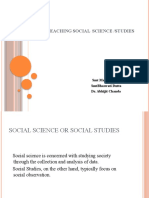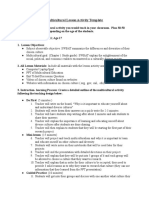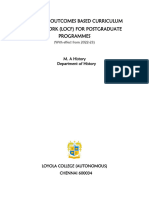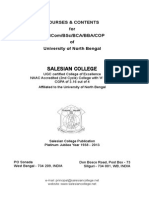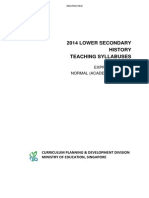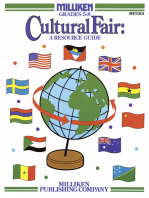History Project Work 2020 21
History Project Work 2020 21
Uploaded by
predatornayanCopyright:
Available Formats
History Project Work 2020 21
History Project Work 2020 21
Uploaded by
predatornayanOriginal Title
Copyright
Available Formats
Share this document
Did you find this document useful?
Is this content inappropriate?
Copyright:
Available Formats
History Project Work 2020 21
History Project Work 2020 21
Uploaded by
predatornayanCopyright:
Available Formats
PROJECT WORK CLASS - XII (2020-21)
INTRODUCTION History is one of the most important disciplines in school education. It is the study of
the past, which helps us to understand our present and shape our future. It promotes the acquisition
and understanding of historical knowledge in breath and in depth across cultures. The course of history
in senior secondary classes is to enable students to know that history is a critical discipline, a process of
enquiry, a way of knowing about the past rather than just a collection of facts. The syllabus helps them
to understand the process, through which a historian collects, chooses, scrutinizes and assembles
different types of evidences to write history. The syllabus in class-XI is organized around some major
themes in world history. In class XII the focus shifts to a detailed study of some themes in ancient,
medieval and modern Indian history. CBSE has decided to introduce project work in history for classes
XI and XII in 2013-14 as a part of regular studies in classroom, as project work gives students an
opportunity to develop higher cognitive skills. It takes students to a life beyond text books and
provides them a platform to refer materials, gather information, analyze it further to obtain relevant
information and decide what matter to keep and hence understand how history is constructed.
OBJECTIVES Project work will help students:
• To develop skill to gather data from a variety of sources, investigate diverse viewpoints and arrive at
logical deductions.
• To develop skill to comprehend, analyze, interpret, evaluate historical evidence and understand the
limitation of historical evidence.
• To develop 21st century managerial skills of co-ordination, self-direction and time management.
• To learn to work on diverse cultures, races, religions and lifestyles.
• To learn through constructivism-a theory based on observation and scientific study.
• To inculcate a spirit of inquiry and research.
• To communicate data in the most appropriate form using a variety of techniques.
• To provide greater opportunity for interaction and exploration.
• To understand contemporary issues in context to our past.
• To develop a global perspective and an international outlook.
• To grow into caring, sensitive individuals capable of making informed, intelligent and independent
choices.
• To develop lasting interest in history discipline.
GUIDELINES TO TEACHERS This section provides some basic guidelines for the teachers to take up
projects in History. It is very necessary to
• One Project should be given to the students in the month of April/May before the summer vacation
and assessment of the project to be completed by September.
• The teachers must ensure that the students submit original work.
• Project report should be hand written only.
• (Eco-friendly materials can be used by students)
The following steps are suggested:
1. Teacher should design and prepare a list of 15-20 projects and should give an option to a student to
choose a project as per his/her interest.
2. The project must be done individually/In-groups.
3.Students in the class avoid repetition of Project work.
4. The teacher should play the role of a facilitator and should closely supervise the process of project
completion, and should guide the children by providing necessary inputs, resources etc. so as to enrich
the subject content.
5. The project work (one per year) can culminate in the form of Power Point
Presentation/Exhibition/Skit/albums/files/song and dance or culture show /story telling/debate/panel
discussion, paper presentation and so on. Any of these activities which are suitable to visually impaired
candidates can be performed as per the choice of the student.
6. Students can use primary sources available in city archives, Primary sources can also include
newspaper cuttings, photographs, film footage and recorded written/speeches. Secondary sources
may also be used after proper authentication.
7. Evaluation will be done by external examiner appointed by the Board in class XII and internal in class
XI. ASSESSMENT Allocation of Marks (20) The marks will be allocated under the following heads:
1 Project Synopsis 2 Marks
2 Data/Statistical analysis/Map work 3 Marks
3 Visual/overall presentation 5 Marks
4 Analysis/explanation and interpretation 5 Marks
5 Bibliography 1 Mark
6 Viva 4 Marks
Total 20 Marks
Note: The project reports are to be preserved by the school till the final results are declared, for
scrutiny by CBSE.
FEW SUGGESTIVE TOPICS FOR PROJECTS
1. The mysteries behind the mound of dead –Mohenjo-Daro
2. An In-depth study to understand Spiritual Archaeology in the Sub-Continent
3. Buddha’s Path to Enlightenment
4. Insight and Reflection of Bernier’s notions of The Mughal Empire
5. An exploratory study to know the women who created history
6. “Mahatma Gandhi” – A legendary soul
7. To reconstruct the History of Vijayanagar through the Archaeology of Hampi
8. The emerald city of Colonial Era –BOMBAY
9. Vision of unity behind the first war of Independence
10. Divine Apostle of Guru Nanak Dev
11. Help, Humanity and Sacrifices during Partition
12. Glimpses inside Mughals Imperials Household
13. The process behind the framing of the Indian Constitution
14. The ‘Brahm Nirupam’ of Kabir – A journey to Ultimate Reality
Note: Please refer Circular No. Acad.16/2013 dated 17.04.2013 for complete guidelines.
You might also like
- Writing - IBDP English B PROPOSAL SampleDocument2 pagesWriting - IBDP English B PROPOSAL Samplesaroso0708100% (4)
- Unit 4 Where We Are in Place and Time Grades 3 4 Sy 2013-2014Document8 pagesUnit 4 Where We Are in Place and Time Grades 3 4 Sy 2013-2014api-26437308333% (3)
- Module in Teaching Social Studies in Elementary GradesDocument45 pagesModule in Teaching Social Studies in Elementary GradesFobe Nudalo67% (3)
- Project Work History Class XII CBSEDocument23 pagesProject Work History Class XII CBSEGsbaGnoida63% (8)
- HISTORY - 027 Class XI & XII (2022-23) Project WorkDocument5 pagesHISTORY - 027 Class XI & XII (2022-23) Project WorkSneha0% (1)
- History ProjectDocument4 pagesHistory Projectneetbio70No ratings yet
- Internal Assessment Marks BreakupDocument2 pagesInternal Assessment Marks BreakupVibhas BhardwajNo ratings yet
- History Project Work Class 8 21 Century'S Iconic Events - A TimelineDocument2 pagesHistory Project Work Class 8 21 Century'S Iconic Events - A TimelineKalim AnsariNo ratings yet
- NEP-HISDocument79 pagesNEP-HISkhanshifa8985No ratings yet
- Class 11 and 12 - History PDFDocument4 pagesClass 11 and 12 - History PDFDAFT FUNKNo ratings yet
- Summary of Unit 1 HistoryDocument7 pagesSummary of Unit 1 HistoryvimveeNo ratings yet
- BRIDGE - COURSE - Class XI - History 2024-2025Document63 pagesBRIDGE - COURSE - Class XI - History 2024-2025aj School Of MusicNo ratings yet
- TSSEG Culture and Geography NOTES ONLYDocument228 pagesTSSEG Culture and Geography NOTES ONLYtambanfrancinNo ratings yet
- Pedagogy of Teaching Social ScienceDocument18 pagesPedagogy of Teaching Social ScienceDrMijanur RahamanNo ratings yet
- 10social Science (Vi-Viii)Document26 pages10social Science (Vi-Viii)api-285643637No ratings yet
- Publikasi Jurnal PDFDocument23 pagesPublikasi Jurnal PDFYulie Siswanto SiswantoNo ratings yet
- Edu 280 New Multicultural Lesson Activity Template AssignmentDocument3 pagesEdu 280 New Multicultural Lesson Activity Template Assignmentapi-549343922No ratings yet
- 07-05-24_1715063041 (1)Document2 pages07-05-24_1715063041 (1)・Sαγҽɳ࿐ ・No ratings yet
- Art HistoryDocument25 pagesArt Historymigaa_58467735No ratings yet
- ArubaDocument7 pagesArubarakshanda ansariNo ratings yet
- Programming: Social Sciences (Fifth Year of Primary Education)Document59 pagesProgramming: Social Sciences (Fifth Year of Primary Education)Angi Efe JotaNo ratings yet
- 12 History Project Guidelines (2022-2023)Document3 pages12 History Project Guidelines (2022-2023)Aman SinghNo ratings yet
- project kl 7 (2)Document7 pagesproject kl 7 (2)Huti EnoNo ratings yet
- HistoryDocument111 pagesHistory22-PHT-030 HAREESH PNo ratings yet
- Revised Unit Plan Toddle - Grade 6 - Term2Document14 pagesRevised Unit Plan Toddle - Grade 6 - Term2michaels.tarynne94No ratings yet
- Indian ArtDocument132 pagesIndian ArtPraveen Kumar100% (1)
- LECTURE 20 - Project-Based Learning Language TeachingDocument3 pagesLECTURE 20 - Project-Based Learning Language TeachingAbish MusaevNo ratings yet
- History Assignment 3-7Document33 pagesHistory Assignment 3-7api-265130269No ratings yet
- Methodology of Teaching HistoryDocument2 pagesMethodology of Teaching HistoryPranav RoyNo ratings yet
- Analisis Materi Pokok SBDP Misd Kurikulum 2013 AbaDocument24 pagesAnalisis Materi Pokok SBDP Misd Kurikulum 2013 AbaSyifa AzzahraNo ratings yet
- FSSE Module 1.activity 1Document10 pagesFSSE Module 1.activity 1Lexanne RomanovaNo ratings yet
- Oxford International Primary HistoryDocument2 pagesOxford International Primary HistoryHlwan Theinkha Aung - Brenden - (Brenden)No ratings yet
- Syllabus SCSDocument308 pagesSyllabus SCSArun Kumar Upadhyay0% (1)
- xii holidays homeworkDocument7 pagesxii holidays homeworkmannat3932No ratings yet
- Arts Throughout HistoryDocument8 pagesArts Throughout Historyapi-264373083100% (4)
- Cbse Class 12 Syllabus 2019 20 HistoryDocument15 pagesCbse Class 12 Syllabus 2019 20 HistorySaahil BawaNo ratings yet
- Modul Ipas Kelass 5Document25 pagesModul Ipas Kelass 5Elida Damai MahitaNo ratings yet
- Unit of Work - FinalDocument31 pagesUnit of Work - Finalapi-368764995No ratings yet
- Tema 1 - Ciencias Sociales Magisterio UnioviDocument5 pagesTema 1 - Ciencias Sociales Magisterio Uniovielena.azcano00No ratings yet
- History Project Work 11Document4 pagesHistory Project Work 11immortalt213No ratings yet
- bird mark,+Journal+manager,+25 เพ็ญพนอ+พ่วงแพDocument10 pagesbird mark,+Journal+manager,+25 เพ็ญพนอ+พ่วงแพAura BostangicaNo ratings yet
- BSCJ Study Guides 3 4 3 2nd Sem 2021 2022Document37 pagesBSCJ Study Guides 3 4 3 2nd Sem 2021 2022DinoBeringuelNo ratings yet
- The Industrial Revolution A Cross-Curricular ResourceDocument68 pagesThe Industrial Revolution A Cross-Curricular Resourceapi-2899426280% (1)
- History Lower Secondary 2014Document104 pagesHistory Lower Secondary 2014alexcus1539No ratings yet
- 5to Investigaciones PceDocument3 pages5to Investigaciones PcewhmooreNo ratings yet
- Promoting Heritage Education Programmes in Schools.Document9 pagesPromoting Heritage Education Programmes in Schools.piscografiaNo ratings yet
- Modul Ajar IPS Geografi Kelas 10 SMA Fase EDocument39 pagesModul Ajar IPS Geografi Kelas 10 SMA Fase EModul Guruku100% (1)
- Literature 102 - Obedized SyllabusDocument8 pagesLiterature 102 - Obedized Syllabusapi-312121939100% (1)
- Social Science BookDocument30 pagesSocial Science BookSushmaNo ratings yet
- Cultural Heritage Teachers HandbookDocument75 pagesCultural Heritage Teachers HandbookLiena RitereNo ratings yet
- Designing Diversity FinalDocument1 pageDesigning Diversity Finalapi-335074492No ratings yet
- History and Evolution of Teaching Materials. DefinitiveDocument16 pagesHistory and Evolution of Teaching Materials. DefinitiveScribdTranslationsNo ratings yet
- Prota PromesDocument17 pagesProta PromesIdris KilbarenNo ratings yet
- E-Museum of Chinese City Site and Local History Learning Sources in Digital EraDocument6 pagesE-Museum of Chinese City Site and Local History Learning Sources in Digital EraHonoratus Irpan SinuratNo ratings yet
- Haveapie College: 0134813103/dp/0134813103/ref MT - Paperback? - Encoding UTF8&me &qid 1572824250Document18 pagesHaveapie College: 0134813103/dp/0134813103/ref MT - Paperback? - Encoding UTF8&me &qid 1572824250api-500203424No ratings yet
- 7th English Socialscience 1Document184 pages7th English Socialscience 1Akshay VilasNo ratings yet
- Monta Ed698 SocialstudiesstatementDocument3 pagesMonta Ed698 Socialstudiesstatementapi-432878153No ratings yet
- Guide of FundamentalsDocument5 pagesGuide of FundamentalsSantos CarrascoNo ratings yet
- A Guide to Methods and Observation in History: Studies in High School ObservationFrom EverandA Guide to Methods and Observation in History: Studies in High School ObservationNo ratings yet
- Indian Politics 2Document2 pagesIndian Politics 2predatornayanNo ratings yet
- Gupta EmpireDocument9 pagesGupta EmpirepredatornayanNo ratings yet
- Project WorkDocument15 pagesProject WorkpredatornayanNo ratings yet
- PDF of Project WorkDocument13 pagesPDF of Project WorkpredatornayanNo ratings yet
- Set 2 2 2Document13 pagesSet 2 2 2predatornayanNo ratings yet
- Class 12 SYLLABUS Hist PractDocument1 pageClass 12 SYLLABUS Hist PractpredatornayanNo ratings yet
- Listening Practice Online LinksDocument3 pagesListening Practice Online LinksHương Giang NguyễnNo ratings yet
- Cambridge English First For Schools Fce For Schools Speaking Assessment Scales PDFDocument2 pagesCambridge English First For Schools Fce For Schools Speaking Assessment Scales PDFbeltranjuanNo ratings yet
- Entrepreneurship FG Edited FINALDocument122 pagesEntrepreneurship FG Edited FINALAthumani100% (1)
- ARI Curriculum VitaeDocument3 pagesARI Curriculum VitaeA RahmanNo ratings yet
- Science6 - Q4 - Ver4 - Mod4 Appropriate Activities For Specific Seasons of The PhilippinesDocument20 pagesScience6 - Q4 - Ver4 - Mod4 Appropriate Activities For Specific Seasons of The PhilippinesCasas, Jo-an Pauline A.100% (3)
- NITRR SyllabusDocument77 pagesNITRR SyllabusDeepak Kumar RaiNo ratings yet
- SRCATDocument2 pagesSRCATLuana Cunha FerreiraNo ratings yet
- Synfocity 419Document4 pagesSynfocity 419Mizoram Presbyterian Church SynodNo ratings yet
- Group CommunicationDocument13 pagesGroup CommunicationPrince JhaNo ratings yet
- Mapping of Program Outcomes and Course OutcomesDocument3 pagesMapping of Program Outcomes and Course OutcomesEla Mae SilmaroNo ratings yet
- Ulrika Bergmark DOC2009Document178 pagesUlrika Bergmark DOC2009Rosario ArrietaNo ratings yet
- Cog1 SG 1Document4 pagesCog1 SG 1Darlene Joy CambayNo ratings yet
- The Effects of Home School EducationDocument8 pagesThe Effects of Home School Educationapi-2371837880% (1)
- VitruviusDocument2 pagesVitruviusAlexLionNo ratings yet
- Deliberations On Discipleship and Training in TheDocument45 pagesDeliberations On Discipleship and Training in TheeltropicalNo ratings yet
- E-Portfolio Project Case StudyDocument8 pagesE-Portfolio Project Case StudyTeresa MacKinnonNo ratings yet
- 740 (Q50, V40, Awa 4Document10 pages740 (Q50, V40, Awa 4rawat2583No ratings yet
- Republic of The Philippines Province of Surigao Del Sur Municipality of Hinatuan Barangay TagasakaDocument6 pagesRepublic of The Philippines Province of Surigao Del Sur Municipality of Hinatuan Barangay TagasakaGLORIFE RIVERALNo ratings yet
- Grade 4-Term 1 Performance Task (2022-2023) NDocument5 pagesGrade 4-Term 1 Performance Task (2022-2023) NSabahath KhanNo ratings yet
- MPU Group Presentation Evaluation Form (20%)Document1 pageMPU Group Presentation Evaluation Form (20%)nazifa zahidNo ratings yet
- Polygons: Daily Lesson Plan Mathematics Form 1 2009Document4 pagesPolygons: Daily Lesson Plan Mathematics Form 1 2009Zarina IdrisNo ratings yet
- Introduction To Educational Sociology Solved MCQ's With PDF Download (Set-1)Document11 pagesIntroduction To Educational Sociology Solved MCQ's With PDF Download (Set-1)nilam thatoiNo ratings yet
- Tangazo La Kuitwa Kazini Juni 18Document6 pagesTangazo La Kuitwa Kazini Juni 18Rashid BumarwaNo ratings yet
- Econ 1530 BOutlineDocument5 pagesEcon 1530 BOutlinebunkonunkoNo ratings yet
- Integrated DM Care - Multidisciplinary ApproachDocument257 pagesIntegrated DM Care - Multidisciplinary ApproachJacob Dougherty100% (2)
- Lesson Plan 1 EnglishDocument2 pagesLesson Plan 1 EnglishAkhtar RajaNo ratings yet
- Aswathy Mount Carmel Edu 103Document8 pagesAswathy Mount Carmel Edu 103Aswathy AshokNo ratings yet
- Rosch Et Al. Basic Objects in Natural CategoriesDocument58 pagesRosch Et Al. Basic Objects in Natural CategoriesIche MikulčićNo ratings yet
- Welder Fitters Program NewDocument9 pagesWelder Fitters Program NewKentDemeterioNo ratings yet
- Interview PreparationDocument2 pagesInterview Preparationnepalapp3No ratings yet













